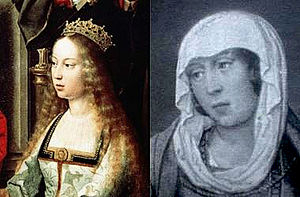War of the Castilian Succession
| War of the Castilian Succession | |||||||
|---|---|---|---|---|---|---|---|
 Left, Isabella I of Castile. Right, Joanna la Beltraneja |
|||||||
|
|||||||
| Belligerents | |||||||
|
|
|
||||||
| Commanders and leaders | |||||||
|
|
|
||||||
The War of the Castilian Succession was the military conflict contested from 1475 to 1479 for the succession of the Crown of Castile fought between the supporters of Joanna la Beltraneja, daughter of the late monarch Henry IV of Castile, and those of Henry's half-sister, Isabella, who was ultimately successful.
The war had a marked international character, as Isabella was married to Ferdinand, heir to the Crown of Aragon, while Joanna was strategically married to King Afonso V of Portugal, her uncle, after the suggestion of her supporters. France intervened in support of Portugal, as they were rivals with Aragon for territory in Italy and Roussillon.
Despite a few initial successes by the supporters of Joanna, a lack of military aggressiveness by Afonso V and the stalemate in the Battle of Toro (1476) led to the disintegration of Joanna's alliance and the recognition of Isabella in the Courts of Madrigal-Segovia (April–October 1476): "In 1476, immediately after the indecisive battle of Peleagonzalo [near Toro], Ferdinand and Isabella hailed the result as a great victory and called Courts at Madrigal. The newly gained prestige was used to win municipal support from their allies …" (Marvin Lunenfeld)."
The war between Castile and Portugal alone continued. This included naval warfare in the Atlantic, which became more important: a struggle for maritime access to the wealth of Guinea (gold and slaves). In 1478, the Portuguese navy defeated the Castilians in the decisive Battle of Guinea.
The war concluded in 1479 with the Treaty of Alcáçovas, which recognized Isabella and Ferdinand as sovereigns of Castile and granted Portugal hegemony in the Atlantic, with the exception of the Canary Islands. Joanna lost her right to the throne of Castile and remained in Portugal until her death.
...
Wikipedia
